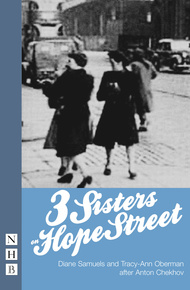 W
W3 Sisters on Hope Street is a 2008 British play co-written by Diane Samuels and Tracy Ann Oberman. The play is a reinterpretation of Chekhov's Three Sisters, transferring events to Liverpool after World War II and re-casting the Pozorov sisters as three Jewish Englishwomen. The play opened on 25 January 2008 at the Everyman Theatre, which is located at Hope Street, Liverpool.
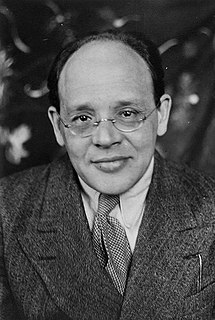 W
WIsaac Emmanuilovich Babel was a Russian writer, journalist, playwright, and literary translator. He is best known as the author of Red Cavalry and Odessa Stories—stories from the life of Jewish gangsters from Odessa led by Benya Krik. He has been acclaimed as "the greatest prose writer of Russian Jewry". Babel was arrested by the NKVD on 15 May 1939 on fabricated charges of terrorism and espionage, and executed on 27 January 1940.
 W
WA badchen or badkhn is a type of Ashkenazic Jewish wedding entertainer, poet, and master of ceremonies originating in Eastern Europe, with a history dating back to at least the seventeenth century. The badchen was an indispensable part of the traditional Jewish wedding in Europe who guided the bride and groom through the stages of the ceremony, act as master of ceremonies, and sing to the bride, groom and in-laws with the accompaniment of klezmer musicians. They also had a traditional role on holidays such as Hanukkah or Purim. Today they are primarily found in Chassidic communities.
 W
WBorscht Belt, or Jewish Alps, is a colloquial term for the mostly defunct summer resorts of the Catskill Mountains in parts of Sullivan, Orange and Ulster counties in upstate New York, United States. A source interviewed by Time magazine stated that the visits to the area by Jewish families was already underway "as early as the 1890s ... Tannersville ... was 'a great resort of our Israelite breathren'...from the 1920s on [there were] hundreds of hotels".
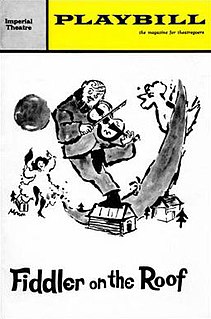 W
WFiddler on the Roof is a musical with music by Jerry Bock, lyrics by Sheldon Harnick, and book by Joseph Stein, set in the Pale of Settlement of Imperial Russia in or around 1905. It is based on Tevye and his Daughters and other tales by Sholem Aleichem. The story centers on Tevye, a milkman in the village of Anatevka, who attempts to maintain his Jewish religious and cultural traditions as outside influences encroach upon his family's lives. He must cope with the strong-willed actions of his three older daughters who wish to marry for love; their choices of husbands are successively less palatable for Tevye. An edict of the Tsar eventually evicts the Jews from their village.
 W
WFidler Afn Dakh is a Yiddish-language adaptation of the musical Fiddler on the Roof translated and adapted by Shraga Friedman. The adaptation revisits the 1894 collection of Yiddish short stories on which Fiddler on the Roof is based, about Tevye the Dairyman. Friedman created the translation for a 1965 Israeli production. It was produced by the National Yiddish Theatre Folksbiene (NYTF) in New York City in 2018 and transferred off-Broadway to Stage 42 in 2019.
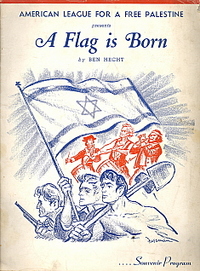 W
WA Flag Is Born is a 1946 play that advocated the creation of a homeland for the Jewish people in the ancient Land of Israel—at the time of the play's release Mandatory Palestine, under British administration. With a cast including Paul Muni, Celia Adler and Marlon Brando, it opened on Broadway on September 4, 1946. It was written by Ben Hecht and directed by Luther Adler, with music by Kurt Weill. A Flag Is Born was produced by the American League for a Free Palestine, an organization headed by Hillel Kook, to raise money for Zionist causes.
 W
WHenryk Grynberg is a Polish writer and actor who survived the Nazi occupation. He is a novelist, short-story writer, poet, playwright and essayist who had authored more than thirty books of prose and poetry and two dramas. Grynberg, known as the “chronicler of the fate of the Polish Jews”, tackled in his writings the Holocaust experience and the post-Holocaust trauma.
 W
WJewish American literature holds an essential place in the literary history of the United States. It encompasses traditions of writing in English, primarily, as well as in other languages, the most important of which has been Yiddish. While critics and authors generally acknowledge the notion of a distinctive corpus and practice of writing about Jewishness in America, many writers resist being pigeonholed as "Jewish voices." Also, many nominally Jewish writers cannot be considered representative of Jewish American literature, one example being Isaac Asimov.
 W
WJudeo-Tat theatre – specializes in staging plays on Mountain Jews themes, created mainly by Mountain Jews. The plays are performed in the Judeo-Tat language (Juhuri).
 W
WTanya Segal is the first full-time female rabbi in Poland and the first female rabbi in Czech Republic (Ostrava) http://www.kehila-ostrava.cz/) Prior to her rabbinic post in Czech Republic, Segal was the first female rabbi in Poland.
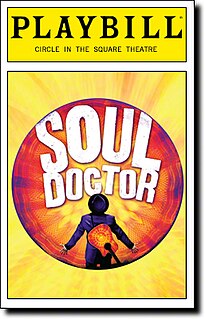 W
WSoul Doctor - Journey of a Rockstar Rabbi is a Broadway musical that details the life of Rabbi Shlomo Carlebach, with music and lyrics by Shlomo Carlebach and David Schechter, and book and direction by Daniel Wise. The Soul Doctor show debuted at Le Petit Theatre du Vieux Carre in New Orleans, and had subsequent runs at The Colony Theater in Miami, The Parker Playhouse in Ft Lauderdale, and The New York Theatre Workshop in New York City. The Broadway production started previews in July 2013 with its official opening night taking place August 15, 2013 at Broadway's Circle in the Square Theatre.
Torch Song Trilogy is a collection of three plays by Harvey Fierstein rendered in three acts: International Stud, Fugue in a Nursery, and Widows and Children First! The story centers on Arnold Beckoff, a Jewish homosexual, drag queen, and torch singer who lives in New York City in the late 1970s and early 1980s. The four-hour play begins with a soliloquy in which he explains his cynical disillusionment with love.
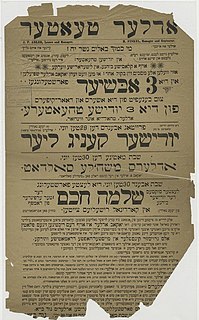 W
WThe Yiddish Theatre District, also called the Jewish Rialto and the Yiddish Realto, was the center of New York City's Yiddish theatre scene in the early 20th century. It was located primarily on Second Avenue, though it extended to Avenue B, between Houston Street and East 14th Street in the East Village in Manhattan. The District hosted performances in Yiddish of Jewish, Shakespearean, classic, and original plays, comedies, operettas, and dramas, as well as vaudeville, burlesque, and musical shows.
 W
WYiddish theatre consists of plays written and performed primarily by Jews in Yiddish, the language of the Central European Ashkenazi Jewish community. The range of Yiddish theatre is broad: operetta, musical comedy, and satiric or nostalgic revues; melodrama; naturalist drama; expressionist and modernist plays. At its height, its geographical scope was comparably broad: from the late 19th century until just before World War II, professional Yiddish theatre could be found throughout the heavily Jewish areas of Eastern and East Central Europe, but also in Berlin, London, Paris, Buenos Aires and New York City.